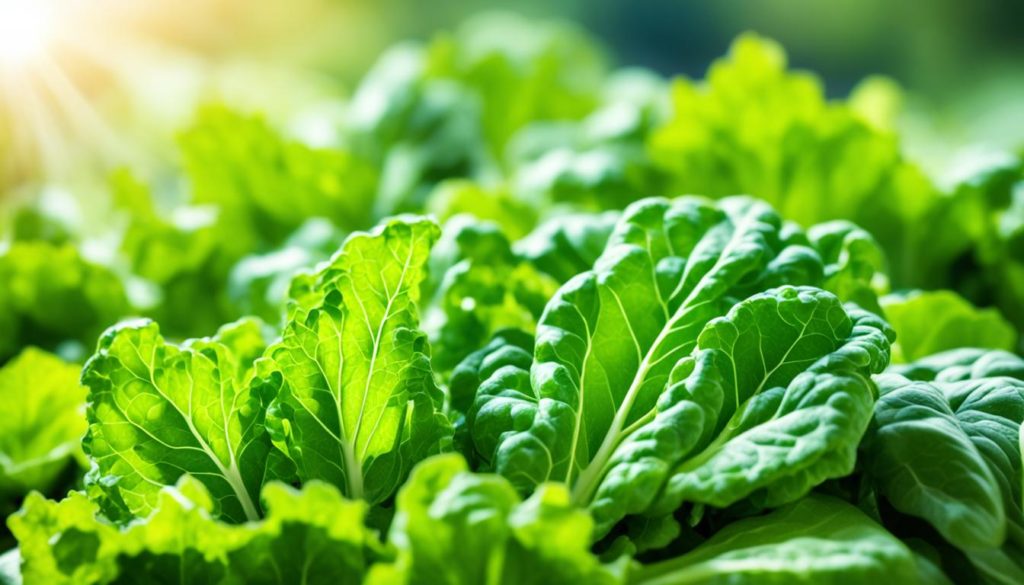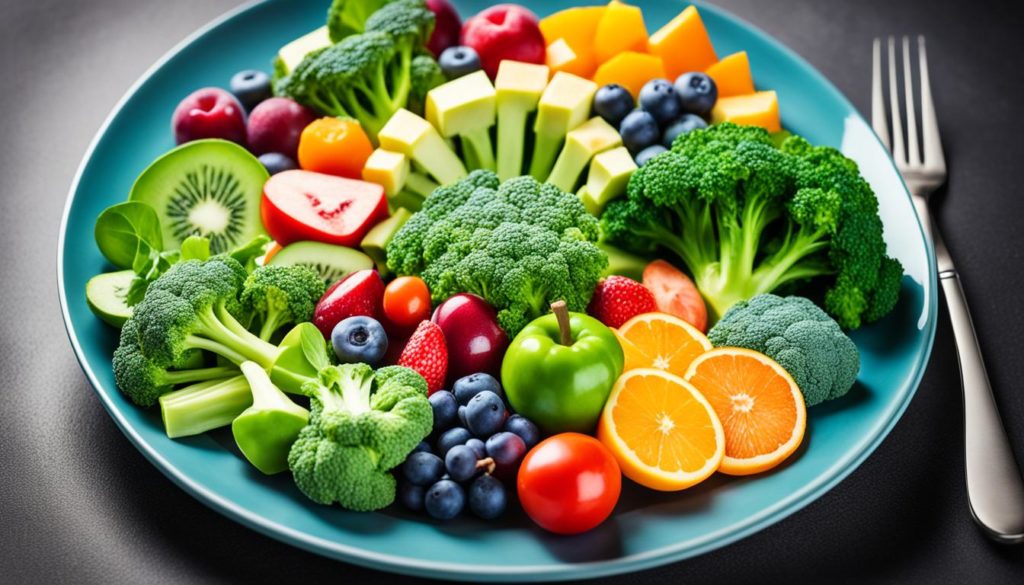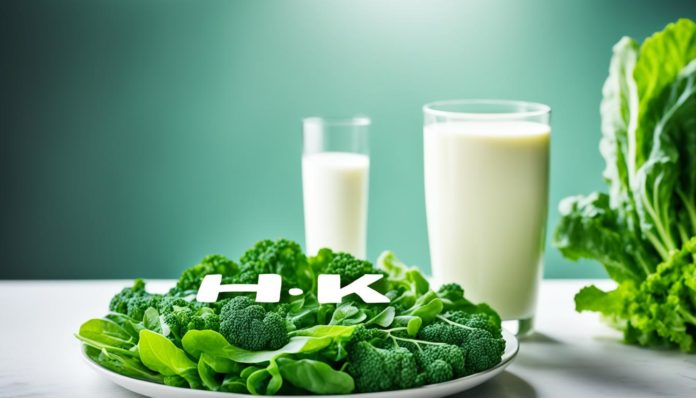Vitamin K2, also known as Menaquinone, is key for our health. It helps with blood clotting, keeps bones strong, and ensures our hearts work well. To reap Vitamin K2’s benefits, include foods rich in it in your meals. Both animal and plant-based foods can provide this nutrient.
Eating foods high in Vitamin K2 ensures you get its many health benefits. Research featured in the “Nutrition Journal” and “International Journal for Vitamin and Nutrition Research” highlight its importance.
Key Takeaways
- Vitamin K2, also known as Menaquinone, is vital for blood clotting, bone health, and heart function.
- A Vitamin K2-rich diet can include animal-based, plant-based, and fermented food sources.
- Integrating K2 vitamin sources into your daily routine supports overall wellness.
- Research from “Nutrition Journal” and “International Journal for Vitamin and Nutrition Research” supports the importance of Vitamin K2.
- Ensuring adequate dietary K2 intake is essential for maintaining optimal health.
The Importance of Vitamin K2 in Your Diet
It’s key to understand the importance of Vitamin K2 in your diet for staying healthy. This nutrient helps control calcium in our bodies. Getting enough Vitamin K2 can cut the risk of bone issues and heart problems.

Experts from “Osteoporosis International” and the “Journal of Nutrition and Metabolism” stress the importance of Vitamin K2 for health. It’s been found that K2 has a big role in keeping our hearts healthy. This shows why it’s smart to eat foods high in Vitamin K2.
| Vitamin K2 Benefits | K2 Vitamin Roles |
|---|---|
| Reduces vascular calcification | Activates calcium-regulating proteins |
| Prevents bone fractures | Supports bone health |
Top Health Benefits of Vitamin K2
Vitamin K2 plays a key role in our body and has many health benefits. It’s vital for strong bones, a healthy heart, and good dental health.
Improves Bone Health
K2 is very important for our bones. It helps create a protein that keeps calcium in our bones. This makes them stronger and less likely to break. The Journal of Bone and Mineral Research says getting enough K2 can make bones denser and more stable.
Supports Heart Health
K2 is also great for the heart. It stops arteries from getting hard by calcification. This lowers the risk of heart diseases. K2 moves calcium to the bones, keeping arteries smooth. Thrombosis and Haemostasis studies show K2 lowers the chances of arteries getting rigid.
Enhances Dental Health
Dental health also benefits from K2. It helps minerals bind properly in our teeth, making them stronger. This means fewer cavities and dental problems. Enough K2 ensures our teeth’s calcium is used well, keeping our dental health in top shape.

| Health Benefit | Description |
|---|---|
| Bone Health | Strengthens bones by binding calcium and improving bone density. |
| Heart Health | Prevents arterial calcification, reducing heart disease risk. |
| Dental Health | Facilitates mineral binding for stronger and healthier teeth. |
Understanding Vitamin K2 (Menaquinone)
Vitamin K2, also known as Menaquinone, plays a key role in our health. This Vitamin K2 explanation will help us understand its benefits. We’ll see how it’s different from other Vitamin K types.
What is Menaquinone?
Menaquinone, or Vitamin K2, is important for blood health and managing calcium in our bodies. While Vitamin K1 is in green veggies and helps with clotting, K2 works on bone and heart health. It makes sure calcium goes to bones and teeth, not arteries.
The Difference Between Vitamin K1 and K2
Vitamin K1 and K2 have different roles and sources. Knowing these helps us choose what to eat for better health. Here’s a closer look:
| Attribute | Vitamin K1 | Vitamin K2 |
|---|---|---|
| Primary Source | Leafy Green Vegetables | Animal Products, Fermented Foods |
| Role | Blood Clotting | Bone and Cardiovascular Health |
| Absorption Efficiency | Lower | Higher |
This table highlights why K2 is great for cell health and making our bones strong. Knowing the difference helps us pick the right foods and supplements.
Common Sources of Vitamin K2
Understanding the different sources of Vitamin K2 is key for health. This nutrient comes from animal and plant foods, and fermented items too. It’s important to know these sources for better diet choices.
Animal-Based Sources
Animal-based K2 is in meat, eggs, and dairy. Cheese has a lot of Vitamin K2. These foods help meet your K2 needs.
Plant-Based Sources
Plant-based K2 is found in some greens and fermented foods. Natto, a Japanese dish made of fermented soybeans, is very high in K2. Adding such foods to your diet broadens your K2 sources.
Fermented Foods
Fermented foods are great for Vitamin K2. This includes natto, sauerkraut, and some cheeses. They’re not just high in K2 but good for gut health too. Eating a variety improves health.
Benefits of Consuming Vitamin K2-Rich Foods
Adding K2-rich foods to your diet can bring you many health benefits. These foods help keep bones strong and support heart health. They also improve skin health, boost the immune system, and may reduce inflammation.
Adding foods high in Vitamin K2 is good for overall health. Fermented foods like natto and certain cheeses are great K2 sources. Liver and egg yolks also have plenty of Vitamin K2.
Below is a table showcasing some common Vitamin K2-rich foods and their respective benefits:
| Food Source | Benefits |
|---|---|
| Natto | High in Vitamin K2, supports bone health |
| Hard Cheeses | Rich in calcium and K2, enhances dental health |
| Egg Yolks | Provides K2, supports skin and immune health |
| Chicken Liver | Packed with nutrients, including K2, supports overall vitality |
Learning about these foods can improve your health significantly. Credible sources support the benefits of K2-rich foods. Including these in your diet can offer a range of health benefits.
How to Identify Vitamin K2 Deficiency
Vitamin K2 is key for bone and heart health. Lacking it can badly affect your health. Spotting the signs of Vitamin K2 deficiency early can prevent serious problems.
Signs and Symptoms
Finding K2 insufficiency symptoms early is crucial. The main signs of Vitamin K2 shortage include:
- Easy bruising
- Frequent nosebleeds or bleeding gums
- Weak bones, which may lead to osteoporosis
- Excessive menstrual bleeding in women
These signs show up because Vitamin K2 is vital for blood clotting and making bones strong.
Health Risks of Deficiency
A lack of Menaquinone can lead to serious health issues. It’s important to understand the risks:
- Osteoporosis: This means bones get weak and can break easily
- Vascular diseases: Higher risk due to poor calcium management
- Heart disease: Greater chances of calcification in arteries
It’s crucial to deal with Vitamin K2 deficiency signs by eating right or taking supplements. This helps manage the risks well.
Supplementing with Vitamin K2: What You Need to Know
If you’re not getting enough K2 from food, think about supplements. Talking to health experts can ensure you get the Menaquinone supplements that are right for you. They will guide you on the right amount and type.
The source of your K2 supplements matters a lot. You want to pick high-quality options from trusted places. This keeps you safe from harmful substances and makes sure the supplements work well. It’s important to use K2 supplements correctly to get all their health benefits without risks.
Research in the “Journal of the American Dietetic Association” shows the good effects of K2 supplements on bones and heart health. “Current Nutrition & Food Science” says following the suggested use of K2 supplements is key. This way, you get the benefits you’re looking for.
For more great info, check out our piece on nutrition essentials. See how using different nutrients together can bring even more health benefits.
| Aspect | Considerations |
|---|---|
| Quality | Select high-grade Menaquinone supplements with verified sourcing and minimal additives. |
| Dosage | Follow healthcare professional recommendations tailored to individual health profiles. |
| Guidelines | Adhere to supplementary K2 intake guidelines to ensure safety and effectiveness. |
Recommended Daily Intake of Vitamin K2
Taking the right amount of Vitamin K2 is key for good health. Knowing the Vitamin K2 dosage needed by different ages helps create a diet that avoids deficiencies.
For Adults
Adults need specific amounts of K2 depending on gender, age, and health. Men usually need 120 micrograms each day. Women should get about 90 micrograms daily. These amounts follow the Institute of Medicine’s advice to help bones and hearts stay healthy.
For Children
Choosing the correct Vitamin K2 for kids means adjusting amounts based on their age and what they eat. Kids need less K2 than adults:
| Age Group | Daily K2 Intake Recommendation |
|---|---|
| 1-3 years | 30 micrograms |
| 4-8 years | 55 micrograms |
| 9-13 years | 60 micrograms |
| 14-18 years | 75 micrograms |
Always talk to a healthcare provider to find the right Vitamin K2 dosage for a growing child.
Potential Side Effects
Vitamin K2 is mostly safe, but it’s smart to know about side effects of K2. Too much can cause clotting issues and affect other medicines like anticoagulants. Sticking to the recommended dose helps avoid problems and benefits health.
Combining Vitamin K2 with Other Nutrients
Mixing Vitamin K2 with other nutrients boosts health, especially for bones and metabolism. The combination of Vitamin K2 and D shows how nutrients work better together. This mix improves our health in big ways.
Vitamin D
Mixing Vitamin K2 with Vitamin D boosts their benefits. Vitamin D helps our bodies absorb calcium properly. It makes sure we get enough of this key mineral.
Meanwhile, Vitamin K2 guides calcium to our bones and keeps it from going into soft tissues. This help cuts down the risk of hard arteries. Research from the Journal of Endocrinology has shown these benefits are bigger when K2 and D are taken together.
Calcium
The partnership of K2 and calcium is very important. They work together to make sure calcium strengthens our bones. This helps fight against bone loss and keeps bones strong as we age.
Having the right amount of K2 and calcium also helps our hearts. It does this by lowering the risk of calcium build-up in our arteries.
Conclusion
We’re wrapping up our deep dive into Vitamin K2. It’s clear that summary of Vitamin K2 benefits highlight its crucial role. This nutrient is key for strong bones, a healthy heart, and good dental health. Adding this vitamin to your diet boosts your overall health.
Vitamin K2 can be found in a variety of foods, from animal products to plants and fermented items. This gives you many options to include it in your meals. If you can’t get enough from food, supplements are a helpful option.
When it comes to Menaquinone, knowing how much to take daily is important. This depends on your age. It’s also wise to combine Vitamin K2 with Vitamin D and Calcium. This mix increases its benefits. Making Vitamin K2 a priority is a big step toward better health.
FAQ
What are the primary health benefits of Vitamin K2?
Vitamin K2, also known as Menaquinone, is vital for several bodily functions. It helps in blood clotting and keeps bones strong. Moreover, it supports heart health by managing calcium in our bodies. This reduces the risk of bone breaks and keeps arteries clear.
What are some good dietary sources of Vitamin K2?
Vitamin K2 is found in various foods. Animal sources include meats, eggs, and dairy, like cheeses. For plant lovers, it’s in fermented foods like natto, a soybean dish from Japan, and some greens.
What is the difference between Vitamin K1 and Vitamin K2?
Vitamin K1 focuses on blood clotting. Vitamin K2, or Menaquinone, has a broader role. It benefits bones and heart by guiding calcium to the right places. This keeps arteries and bones healthy.
How important is Vitamin K2 for overall health?
Including Vitamin K2 in your diet is key. It activates proteins that control calcium, which is great for your bones and heart. Getting enough can lower the risk of vascular diseases and bone fractures. It’s essential for feeling good overall.
Can I get enough Vitamin K2 through my diet alone?
A balanced diet with both animal and plant foods can provide enough Vitamin K2. But, if you’re not getting enough from food, consider Vitamin K2 supplements. Always talk to a doctor first.
What are the signs of a Vitamin K2 deficiency?
Not having enough Vitamin K2 can show as easy bruising, bleeding too much, and weak bones. Over time, this can lead to serious issues like osteoporosis and heart disease. This is due to poor calcium regulation.
Are there any side effects associated with Vitamin K2 supplementation?
Vitamin K2 is usually safe, but taking too much has risks. Always stick to the recommended dose. Talk with a healthcare provider to use supplements correctly.
How does Vitamin K2 interact with Vitamin D and calcium?
Vitamin K2, Vitamin D, and calcium are a great team for your bones. Vitamin D helps absorb calcium. K2 makes sure calcium goes into bones, not soft tissues. This trio enhances your health greatly.
What is the recommended daily intake of Vitamin K2 for adults and children?
How much Vitamin K2 you need changes with age. Adults need more, and kids need less. Always follow health guidelines and consult with a healthcare expert for advice tailored to you.


